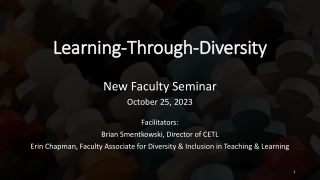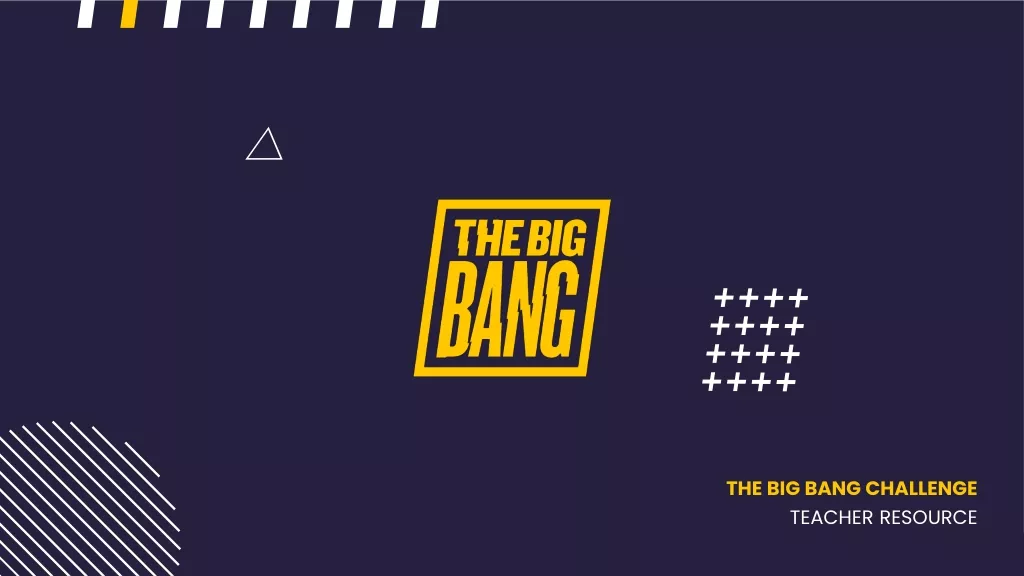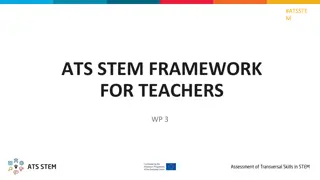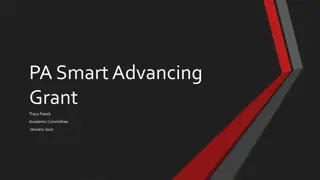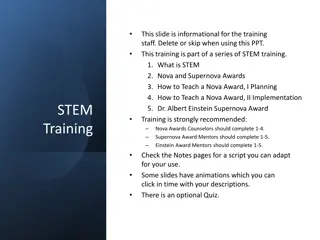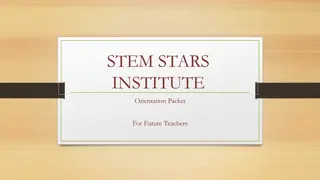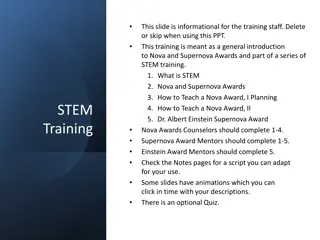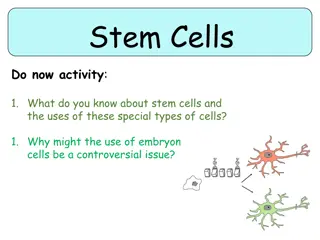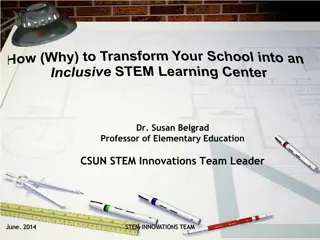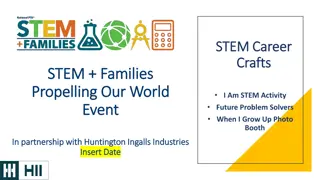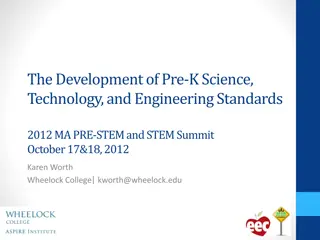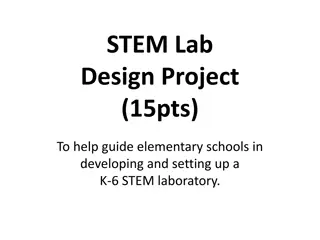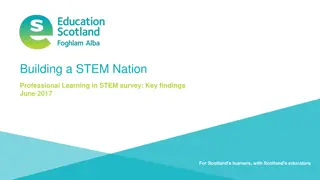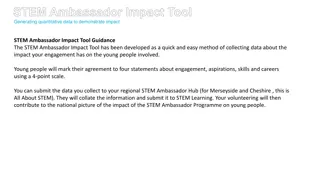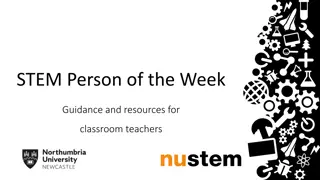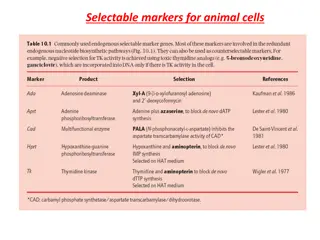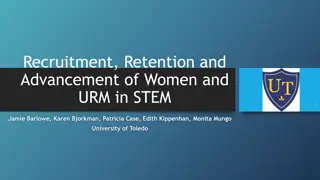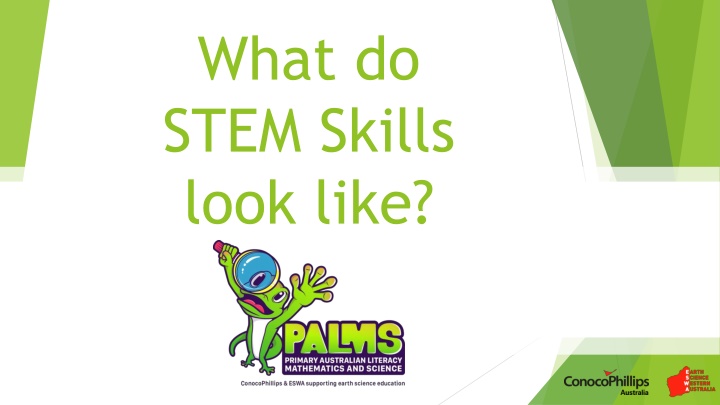
Unlocking STEM Skills Through Practical Scenarios
Explore the essence of STEM (Science, Technology, Engineering, Mathematics) skills through real-life scenarios like problem-solving and creativity. Develop a deeper understanding of the skills required for STEM projects in an engaging manner.
Uploaded on | 0 Views
Download Presentation

Please find below an Image/Link to download the presentation.
The content on the website is provided AS IS for your information and personal use only. It may not be sold, licensed, or shared on other websites without obtaining consent from the author. If you encounter any issues during the download, it is possible that the publisher has removed the file from their server.
You are allowed to download the files provided on this website for personal or commercial use, subject to the condition that they are used lawfully. All files are the property of their respective owners.
The content on the website is provided AS IS for your information and personal use only. It may not be sold, licensed, or shared on other websites without obtaining consent from the author.
E N D
Presentation Transcript
What do STEM Skills look like?
Firstly, what is STEM? STEM is an acronym that stands for: Science Technology Engineering Mathematics It s a way of thinking, solving problems and making things work better.
What skills do you need for STEM projects? We re going to work our way through a series of scenarios to find out what skills will help you solve problems using a STEM way of thinking.
Scenario 1 Locked Out! You lock yourself out of the house and know you would be in big trouble if you break a window or damage any locks to get in. What should you do? What skill are you using?
SKILL - Problem Solving You are presented with a problem (being locked out) and have to work out how to solve that problem. You could consider: Do you actually need to get in? (possibly not if someone else may be home soon) Could you call someone? (If you have a phone) Could you wait at the house of a neighbour or friend? Often you will do one of these things without even thinking to much about it, especially if it s a problem that you have faced before. Problem solving is an important skill that develops over time.
Scenario 2 Dont Upset Mum! Your Mum s birthday is coming up. You don t have a lot of money but you want to get her a present (she deserves one!). Things to consider: One of your chores is organising the recycling Nanna gave you a huge art kit for Christmas What skill are you using?
SKILL - Creativity You would be using your creativity to make something with the resources (materials and equipment) available to you. This requires a different kind of thinking to other STEM skills and people will approach this in a wide variety of ways. Your Mum will love getting a hand-made gift too!
Scenario 3 Hard Choice You have been saving your money and have $70 to spend. You have been researching new games for your console (X-Box, PS4, Nintendo Switch or other). Options to consider: You could buy Game A which is really popular and none of your friends have it yet. It s pretty difficult to master and quite violent (this could make your parents angry!). You could buy Game B which you know all of your friends would enjoy and it s less violent, easier to play and is on special (25% off). Which would you choose and why? What skill did you use to make your choice?
SKILL - Critical Analysis Being able to make informed choices is an important skill for use in STEM. We call this critical analysis. Finding out all you can about different options and choices will help you to make a decision based on facts rather than your gut feelings. This skill also helps you to look at a solution in detail and decide if it is the best possible solution or if you could change something to make the outcome better!
Scenario 4 Good Grandchild Your Nanna has broken her hip and has asked if you can help with her overgrown garden. Options to consider: Doing the gardening yourself. This will take most of your Saturday and you will miss out on playing basketball with your friends at the local courts. Also, you have no idea how to tell a weed from a plant. Or you could get your friends to help you. It will take a lot less time and you can still play basketball! Plus your friend Phillip often helps his grandparents with their garden and will likely provide you with some good advice. Which option would you choose and why? What skill have you used here?
SKILL - Teamwork If you chose working together and utilising the skills of your friends, you achieved a better outcome getting the task done quickly and efficiently. Everyone brings different skills and experience to a team and these differences make a team more effective. Teamwork is another vital skill for working in STEM. Think about including experts in your team so you don t need to know everything.
Scenario 5 Best Path On school camp, you have the opportunity to go orienteering. This is when you learn to use a compass to help you to navigate to different places (checkpoints). One student tells the class he knows how to use a compass so most people decided to follow him rather than navigating for themselves. They follow along from checkpoint to checkpoint, in alphabetical order, eventually completing the course. You decide to make sure you get practice using the compass and find the checkpoints yourself. You also find out that if you climb a tree, you can actually see all of the flags at the checkpoints and you won t have to back track if you visit them out of alphabetical order (no one said you couldn t do this!) You reached the final checkpoint before the rest of the class and walked a shorter distance! What skill did you use?
SKILL - Independent Thinking Would you jump off a cliff if everyone else did?............ It is important to think for yourself. By not following the crowd and doing things the same way they ve always been done, you are thinking outside the box and will find you come up with some amazing ideas! Inventors are very good at independent thinking and this is another important STEM skill.
Scenario 6 Nervous Presenters! As part of your studies on government, your teacher assigns a group project to research how laws are made in Australia. After researching, your group will do a presentation to the class about what the group has found. Two people refuse to speak in front of the class as they are too anxious. You suggest that perhaps your group could do a video presentation instead, in a news broadcast style. You check with your teacher who thinks that this is a great idea as it also covers some of your learnings in Digital Technologies and English. Your group ends up getting a really good mark (and also learns a lot about laws in Australia and video editing!) What skill did you use?
SKILL - Initiative You thought about how you could overcome the problem then asked your teacher if that would fit the assignment this shows initiative. You didn t just give up on the problem. You took a risk (your teacher may have said no) to help solve the issue. Initiative is all about exploring and taking calculated risks with an open mind. It s about going a step further without prompting and thinking ahead about consequences or outcomes. You don t always have success from taking these risks but you will always learn something!
Scenario 7 Surprise Party! You are organising a surprise birthday party for your best friend. It s going to be a picnic at a secret park in your area. It is a little hidden but you think everyone in your year knows about it. To avoid your best friend finding out about the surprise, you send email invites and make it clear that people are only allowed to discuss the party via email and not in person. On the day of the party, only about half of the people attending arrive on time which makes the surprise less special. You later find out that there are actually two secret parks in the area and some people went to the other one! What skill could you have used a little better to stop this happening?
SKILL - Communication If you had communicated clearly with people everyone would have known which secret park the party was being held at (maybe a map or mentioning a landmark close by would have helped). When working on a STEM problem, communication is really important. You need to be able to communicate about the problem you re investigating, how you intend to investigate the problem and also any ideas you have to solve the problem. When working on a problem in a team, communication is even more important!
Scenario 8 Dads Phone Your Dad just got a new mobile phone that is quite different to his old one. He is finding it really difficult to work it out. He asks you to help, so you spend some time playing around with the phone to see if you can figure it out. You then teach your Dad what you ve learnt. What skill have you used to help out your Dad?
SKILL - Digital Literacy Digital literacy is the ability to use technology and digital data to help you to understand and solve problems. Technology changes so quickly and people can find it challenging to keep up (especially older people like your Dad!).
STEM Skills To sum up, STEM Skills include: Problem solving Creativity Critical analysis Teamwork Independent thinking Communication Digital literacy Hopefully you have more of an idea of what each of these skills look like and can apply them to your projects. Happy STEM-ing!


